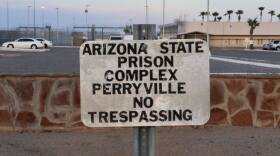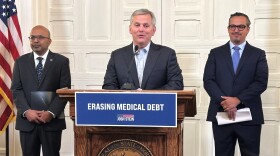As many as 1 million families in North Carolina have fallen behind on their electric, water and sewage bills, threatening residents and their cities with severe financial hardship unless federal lawmakers act to approve more emergency aid.
The trouble stems from the widespread economic havoc wrought by the coronavirus, which has left millions of workers out of a job and struggling to cover their monthly costs. Together, they’ve been late or missed a total of $218 million in utility payments between April 1 and the end of June, according to data released recently by the state, nearly double the amount in arrears at this time last year.
In some cases, cities that own or operate their own utilities have been forced to absorb these losses, creating a dire situation in which the government’s attempt to save people from the financial brink instead has pushed municipal coffers to their own breaking point.
In Elizabeth City, N.C., for example, about 2,500 residents haven’t paid their electric bills on time, according to Richard Olson, the city manager. The late payments at one point proved so problematic that Olson said he calculated Elizabeth City wouldn’t have enough money to pay for its expenses in July. In response, city leaders requested and obtained a waiver from a statewide order, issued in March, that protects people from being penalized for their past-due utility bills.
The predicament has presented unique budget challenges throughout North Carolina, while illustrating the consequences of a cash crunch plaguing the entire country. State and federal leaders have extended a range of coronavirus relief programs since March to try to help people through the pandemic. But the money is limited and restricted — and it’s not clear whether more help from Congress is on the way — creating a crisis in which the nation’s economic woes are outpacing some of the aid programs adopted to combat them.
“We are entering a phase where the utilities (may) be able to shut off power, but what was propping up people’s economic lives, the unemployment benefits and Cares Act support, won’t be there,” said Paul Meyer, the executive director of the North Carolina League of Municipalities.
The future of that safety-net support — and other federal aid — hangs in the balance as lawmakers returned to work this week in their final sprint ahead of the August recess. The White House and congressional leaders are split over the contours of the next coronavirus relief package, including the need to extend more aid to cities and states and reauthorize an extra $600 in weekly unemployment payments that were approved as part of the Cares Act in March.
Outside Washington, workers, businesses and government officials nationwide have pleaded with federal lawmakers to renew or expand those programs. Last week, Roy Cooper, the Democratic governor of North Carolina, urged Congress to act swiftly and adopt a wide array of new federal spending, stressing in a letter that the “actions you take in the next few weeks are vital to our ability to emerge from this crisis. ”
With his state facing its own share of financial duress, Cooper in late March issued a directive sparing residents from losing water and electricity services in the middle of the pandemic. The shut-off moratorium also prohibited private and city-owned utilities from imposing late fees or charging people interest on undue balances, and put in place a process in which struggling families can pay the amounts they owe over a six-month period.
Since then, as many as 1 million residential accounts in North Carolina have fallen behind on their payments and become eligible for disconnection, but haven’t had their utilities shut off as a result of the governor’s order, according to state data. North Carolina officials cautioned the number is an estimate that may double-count some families, especially if they failed to pay multiple kinds of utility bills on more than one occasion, and it doesn’t include all utility providers in the state.
Many of the missed payments appear to have affected privately owned utilities, including major providers such as Duke Energy, according to North Carolina officials. The company says it is refraining from disconnecting those who do not pay, and it has more than 130,000 customers in North Carolina who are 60 days behind on their bills, said Neil Nissan, a company spokesman.
But the overdue balances have proven even more troublesome for North Carolina cities that own and manage their own utilities. These municipalities, which may generate their own power or purchase then sell it to their residents, say they have seen sharp declines in revenue that have cleaved deeply into their budgets, creating financial havoc at a time when they’re already struggling to break even.
The situation has been most dire for rural towns such as Red Springs, a community of more than 3,000 in the southern part of the state. Nearly 40 percent of its residents fell behind on their electricity bills just last month, said David Ashburn, its manager. Red Springs purchases its power as part of a local consortium from Duke Energy, so it must front the costs for electricity even when its residents are late with their own payments, compounding the city’s month-to-month budget difficulties.
“There are all kinds of factors that play into the fact you’re not getting what you normally get and what you base your budget on,” Ashburn said.
In Red Springs and throughout North Carolina, city leaders have responded to the revenue crunch by halting planned upgrades to their electrical grid. If people ultimately do not pay what they owe, they may have no choice but to raise their electricity rates to satisfy the financial conditions under the bonds that allow them to operate, said Drew Elliot, the senior governmental affairs liaison at ElectriCities, which represents municipally owned utilities in the state.
Such financial turmoil led the N.C. League of Municipalities and its allies to urge top state officials for weeks to allow the moratorium to expire, and Cooper in recent days has said he will not renew it. Some of the city-owned utilities caution they do not plan to reinstate penalties or shut-offs right away, choosing instead to try to work with residents in need to help them catch up on their payments. But they will face big decisions in the coming weeks if the more than 1 million North Carolinians behind on their bills are unable to resume making payments.
In Raleigh, the state’s capital, top budget aides say they could have provided residents more lasting relief beyond July — while keeping local cities’ balance sheets from falling into the red — if Congress had offered more assistance.
In March, federal lawmakers authorized $150 billion in local government aid as part of the Cares Act, which can be put toward covering pandemic-related expenses. But the money cannot be used to cover governmental budget gaps, including the fiscal holes created by residents who fell behind on their utilities, according to budget aides who spoke on the condition of anonymity to describe the governor’s thinking. A spokesman for Cooper declined to comment further.
Instead, congressional inaction runs the risk of creating even more financial havoc, experts said, leaving local residents struggling mightily to pay — with an even smaller safety net at their disposal.
“You’re going to have a public-health catastrophe, and your utility is going to fail anyway,” said Al Ripley, a consumer and housing specialist at the North Carolina Justice Center, later adding: “It’s going to get worse.”









